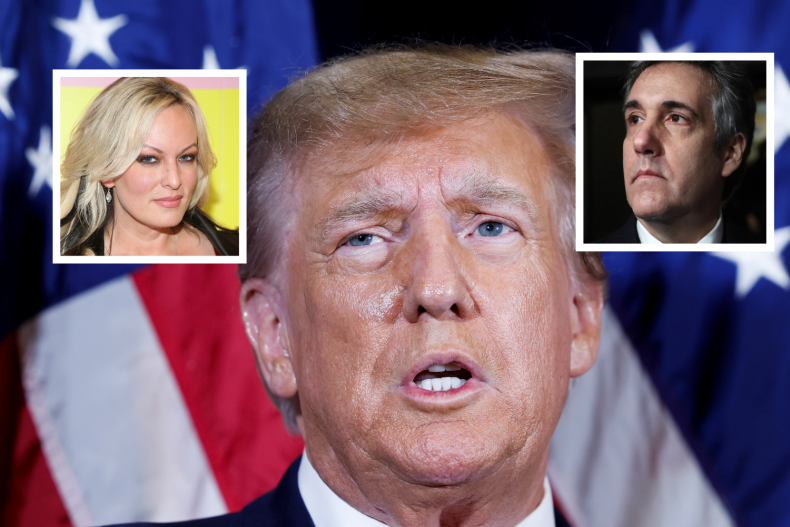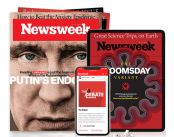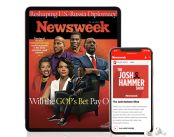Why Was Donald Trump Indicted? Case, Potential Charges Explained
Former President Donald Trump was indicted on Thursday in New York, and while the charges have yet to be released, he was being investigated on charges of falsifying business records in connection to hush money payments made to adult film actress Stormy Daniels.
Trump's indictment comes after years of investigations in multiple states, something he called a "witch hunt" designed to damage his reputation. Prosecutors have been criticized for taking too long to indict Trump and for relentlessly pursuing him because of a political bias in the Department of Justice (DOJ). Trump first announced that his arrest was imminent back on March 18, saying it could come as early as March 21, although the timing was unclear.
On Thursday, March 30, Trump's attorney announced that the former president had been indicted, although he didn't elaborate on what the charges were. Trump denied any wrongdoing in all investigations. Ahead of the indictment, his attorney, Joe Tacopina, admitted that Trump signed off on the Daniels payment. But he said it wasn't a "crime" and denied that Trump lied when he said he didn't know about the payment in 2018.
"Here's why it's not a lie," Tacopina said on March 15. "Because it was a confidential settlement. So, if he acknowledged that, he would be violating the confidential settlement."
Dave Aronberg, Palm Beach County, Florida State Attorney, told Newsweek that while the Manhattan case may be the least strong of the four possible criminal cases against Trump, it is not necessarily a weak case.
"Trump has made several damaging admissions that will make the case easier for prosecutors," Aronberg told Newsweek. "There may also be some surprises in the indictment in the form of additional financial crimes that could complicate matters for the former President."
Trump is also facing two federal investigations and a probe from Fulton County, Georgia, for unrelated charges.

Daniels said Trump paid her to remain quiet after the two allegedly had an affair in 2006 when he was married to former first lady Melania Trump. In 2018, Donald Trump's former attorney, Michael Cohen, pleaded guilty to a federal charge related to the payment, which was allegedly made in 2016.
Cohen has spoken out publicly since his release from prison and said that Trump ordered him to pay the money for the "principal purpose of influencing" the election in 2016. He said Trump's company repaid him the money he gave to Daniels and classified it as "legal fees."
"My position is that, at the end of the day, Donald Trump needs to be held accountable for his dirty deeds, if in fact that's the way that the facts play out," Cohen told reporters after testifying before the grand jury.
Ahead of Bragg announcing his decision, local, state and federal law enforcement and security agencies conducted security assessments around the court.
Speculation that Trump's indictment was nearing increased two weeks ago when Daniels met with prosecutors. That was considered one of the final steps before the inquiry would conclude. Trump was invited to testify before the grand jury, although, it does not appear that he accepted the offer, with his attorney saying days prior to the indictment that he didn't plan to.
The indictment could create chaos in the 2024 presidential election, with some speculating that the looming charges helped convince Trump to run. Trump was largely shielded from any legal consequences when he was president because of a DOJ policy against indicting a sitting president. The leading candidate in the Republican field, Trump told supporters at this month's Conservative Political Action Conference that he wouldn't "even think about leaving" the race if he was indicted and said it could boost his polling numbers.
While Trump is still legally able to run for president if he is convicted, a failed indictment could bolster his ambitions to return to the White House. Polls after the FBI's raid of Trump's Mar-a-Lago home last summer showed that he got a boost among his supporters and a surge in fundraising.
"If they bring this case, I believe this will catapult him into the White House," Tacopina told MSNBC. "I believe it, because this will show how they're weaponizing the justice system."
The raid also helped unify a divided Republican Party. Even Trump's main rival, Florida Governor Ron DeSantis, criticized the raid.
In a video posted to social media last Friday, Trump warned his supporters that while he's being targeted, the investigations aren't only about him. Trump told supporters the investigations are also against his supporters.
Trump's attorney has previewed the team's legal strategy, claiming that Trump was a victim of extortion, and criticized the DOJ for going after a victim.
Newsweek reached out to Trump's representatives for comment via email.

